
FASTING during Ramadan can improve person’s health, but a proper diet is essential to get the benefits of fasting. Writes SMA Ronie
To enjoy the full benefit from fasting, you must spare a great deal of thought to the type and quantity of food you will indulge in through the blessed month of Ramadan. Overeating cannot only harm your body, but also it is thought to interfere with a person’s spiritual growth during the month. A diet, less than a normal amount of food but sufficiently balanced, can keep you healthy and active during Ramadan. The diet should be simple and not differ too much from your normal everyday diet. It should contain foods from all the major food groups, as shown below suggested by health experts.
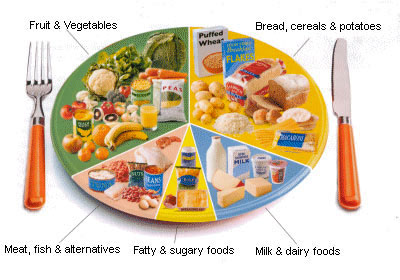
Meals during Ramadan should remain a meal and not become a feast. So, try to minimize the rich, special dishes that traditionally celebrate the fast and keep to the advice included in the table opposite. In this regard, complex carbohydrates are foods that will help release energy slowly during the long hours of fasting. Complex carbohydrates are found in grains and seeds, like barley, wheat, oats, millets, semolina, beans, lentils, wholemeal flour, basmati rice, etc. Fibre-rich foods are also digested slowly and include bran, cereals, whole wheat, grains and seeds, potatoes with the skin, vegetables such as green beans and almost all fruit, including apricots, prunes, figs, etc.
Bread, Other Cereals & Potatoes 
| Includes | Other cereals means things like breakfast cereals, pasta, rice, oats, noodles, maize, millet and cornmeal. Beans and pulses can be eaten as part of this group |
| Nutrients | Carbohydrate (starch), Fibre, some calcium and iron, B Vitamins |
| How much | Eat lots |
| Try to eat | Wholemeal, wholegrain, brown or high fibre versions where possible |
| Try to avoid | – Having them fried too often (e.g. chips)
– Adding too much fat (e.g. thickly spread butter, or margarine on bread) – Adding rich sauces and dressings (e.g. cream or cheese sauce on pasta) |
Fruit & Vegetables
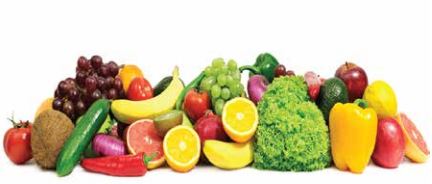
| Includes | Fresh, frozen and canned fruit and vegetables and dried fruit. A glass of fruit juice can also contribute. Beans and pulses can be eaten as part of this group. |
| Nutrients | Vitamin C, Carotenes, Folates, Fibre and some carbohydrate |
| How much | Eat lots |
| Try to eat | A wide variety of fruit and vegetables |
| Try to avoid | Adding fat or rich sauces to vegetables (e.g. carrots glazed with butter, roast parsnips)
Adding sugar or syrupy dressing to fruit (e.g. stewed apple with sugar) |
Milk & Dairy Foods
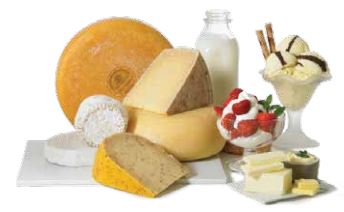
| Includes | Milk, cheese, yogurt and fromage frais. This group does not include butter, eggs and cream. |
| Nutrients | Calcium Protein, Vitamin B12, Vitamins A and D |
| How much | Moderate amounts and choose lower fat versions whenever you can. |
| Try to avoid | Lower fat versions means semi-skimmed or skimmed milk, low fat (0.1% fat) yogurts or fromage frais, and lower fat cheeses (e.g. Edam, Half-fat Cheddar, Camembert)
Check the amount of fat by looking at the nutrient information on the labels. Compare similar products and choose the lowest. (e.g. 8% fat fromage frais may be labelled low fat but is not actually the lowest available) |
Meat, Fish & Alternatives
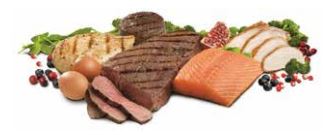
| Includes | Meat, poultry, fish, eggs, nuts, beans and pulses. Meat includes bacon and salami and meat products such as sausages, beef burgers and pate.
These are all relatively high fat choices. Beans, such as canned baked beans and pulses are in this group. Fish includes frozen and canned fish such as sardines and tuna, fish fingers and fish cakes. |
| Nutrients | Iron, Protein, B Vitamins – specially B12, Zinc and Magnesium |
| How much | Eat moderate amounts and choose lower fat versions whenever you can. |
| Try to eat | Lower fat versions means meat with the fat cut off, poultry without the skin and fish without batter.
Cook these foods without added fat. Beans and pulses are good alternatives to meat as they are naturally very low in fat. |
Fatty & Sugary Foods
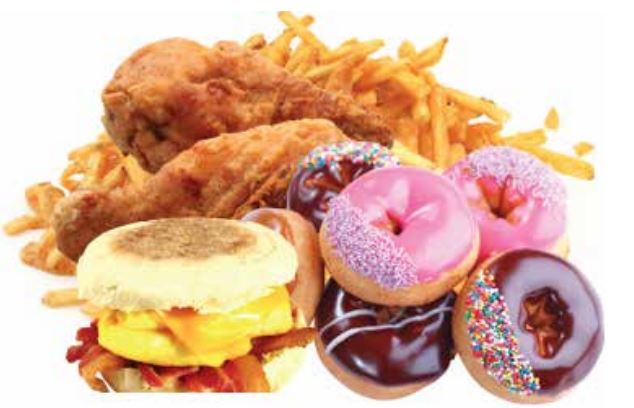
| Includes | Margarine, low fat spread, butter, other spreading fats, cooking oils, oily salad dressings or mayonnaise, cream, chocolate, crisps, biscuits, pastries, cake, puddings, ice- cream, rich sauces and fatty gravies, sweets and sugar. |
| Nutrients | Some vitamins and essential fatty acids but also a lot of fat, sugar and salt |
| How much | Eat fatty and sugary foods sparingly – that is, infrequently and/or in small amounts. |
| Try to eat | Some foods from this group will be eaten every day, but should be kept to small amounts. (e.g. margarine, low fat spread, butter, other spreading fats, cooking oils, oily salad dressings or mayonnaise)
Other foods from this group are occasional foods. (e.g. cream, chocolate, crisps, biscuits, pastries, cake, puddings, ice-cream, rich sauces and fatty gravies, sweets and sugar) |
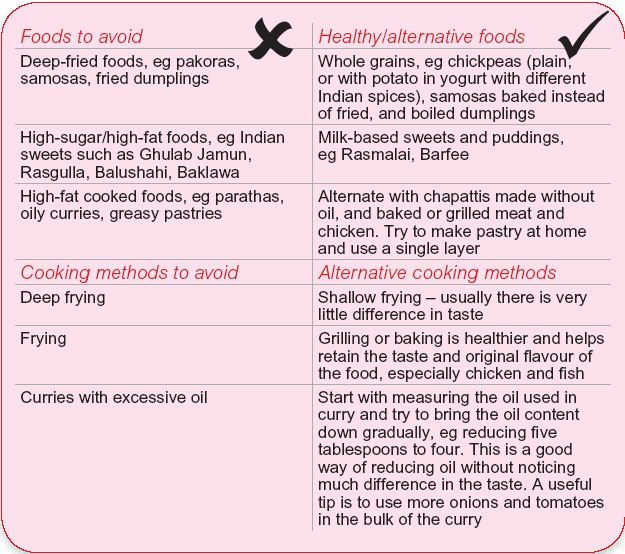
Foods to avoid include the heavily-processed, fast-burning foods that contain refined carbohydrates in the form of sugar, white flour, etc., as well as, of course, too much fatty food (eg cakes, biscuits, chocolates and sweets, such as Indian Mithai). Caffeine content in drinks such as tea, coffee and cola should be worth avoiding.
Sehri (Suhoor), the pre-dawn meal, should be a wholesome, moderate meal that is filling and provides enough energy for many hours. Hence, slowly-digesting foods are particularly important during this meal.
Iftar is the meal which breaks the day’s fast. This meal may include dates, as per the traditions. Dates will provide a refreshing burst of much-needed energy. Fruit juices will also have a similar, revitalizing effect.
The most commonly consumed foods by Prophet Mohammed (peace be upon him) were milk, dates, lamb/mutton and oats. Healthy foods mentioned in the Holy Qur’an are fruits and vegetables, such as olives, onions, cucumber, figs, dates, grapes as well as pulses such as lentils. The encouragement of fish can be seen in the fact that Islamic law spares fish from any specific slaughter requirements, making it easy to incorporate fish in a meal.
Source: A research paper of Department of Health, UK



